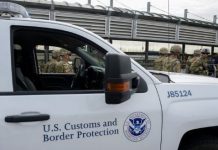
May 25 (UPI) — The U.S. Fourth Circuit Court of Appeals on Thursday upheld a lower court ruling that blocked the implementation of President Donald Trump‘s so-called “travel ban.”
In March, federal judges in Hawaii and Maryland blocked Trump’s revised ban, ruling it likely violated the Constitution by disfavoring Muslims. The Fourth Circuit is the first appeals court to rule on the revised immigration order.
Trump said his second order, signed March 6, was a “watered down” version of the first, crafted to withstand the legal challenges that prompted the first order to be struck down — specifically, that it applied a religious test to those seeking to enter the United States.
Acting Solicitor General Jeffrey B. Wall told the Fourth Circuit Court of Appeals that Trump’s immigration order was “not a Muslim ban.”
“Its text doesn’t have to anything to do with religion. Its operation doesn’t have anything to do with religion,” Wall said during proceedings.
The appeals court disagreed and upheld the injunction blocking Trump’s immigration order from taking effect.
In the revised order, the Trump administration pointed out that the ban applied to people of all religions in the affected countries, not just Muslims. The administration also argued the order did not create a religious test because the total number of Muslims affected by the ban amounted to about 9 percent of the world’s Muslim population.
The president’s revised order seeks to ban travel from Iran, Libya, Somalia, Sudan, Syria and Yemen for at least 90 days, and temporarily halt all refugee applications for 120 days. Trump has said that the suspensions allow much-needed time to review the nation’s immigration and refugee evaluation procedures to ensure potential terrorists aren’t allowed to enter the country.
Trump’s revised travel ban dropped some of the most controversial elements of the first one. It removed Iraq from the list of nations excluded from immigration after the military said it threatened to sour relations with the country, which is leading efforts to fight the Islamic State in Iraq with the support of a U.S.-led international coalition.
It also dropped language that would have given Christians in affected countries the first opportunity to apply for visas and refugee status — which further opened the administration to charges of religious discrimination — and added language to make clear that existing green card and visa holders are exempt, which was a point of confusion during the rollout of the first order.
When the first order was signed in January, it led to chaotic scenes at some U.S. airports, as families of those traveling from the prohibited countries were left without answers about when — or if — their loved ones would be let into the country.
After a judge in Seattle blocked the first travel ban, Trump assailed the decision — and the judge, personally — with attacks on Twitter and promised his administration would fight the ruling on appeal. After the Ninth Circuit Court of Appeals upheld the district court’s decision, Trump relented and replaced the executive order with a version the White House believed could stand up to legal challenge.





